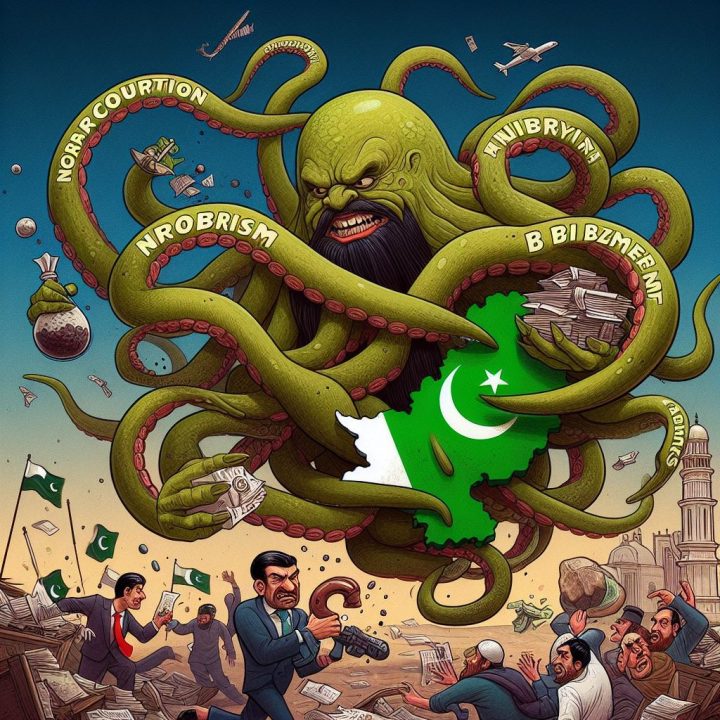By Syed Atiq ul Hassan, Sydney Australia

[A succinct overview of Pakistan’s transition from an Islamic Republic of Pakistan to what I term the “Military Republic of Pakistan,” highlighting key historical events and recent developments that underscore the growing influence of the military in governance of the state]
Pakistan was created as an independent Islamic democratic state on 14 August 1947, but state remained under the control of British army through a British army until 1951.
The first Commander-in-Chief of Pakistan was a British General Sir Frank Walter Messervy appointed on 15 August 1947, followed by another British General Sir Douglas Gracy from 11 February 1948 to 1951. Then the first native General Ayub Khan became the 3rd Commander-in-Chief on 23rd January 1951 until 26 October 1958. General Ayub Khan also became the defence minister of Pakistan in 1954 appointed in his cabinet by a Bengali politician and an army General President Iskandar Mirza. Army involvement never ended as General Ayub Khan suspended the 1956 Constitution through bringing the first Martial law in Pakistan and became the Martial Law administrator in 1958.
Army never finished its running state affairs. General Ayub Khan introduced a Presidential system in 1962 with a new constitution. Since then, the tale of army rule in Pakistan spread over last 76
years directly through Martial Law or a customised so-called democratic system back of army. Over in 7 decades army created a strong establishment of triangular power that is army, bureaucracy and Judiciary.
Delving into Pakistan’s history, it’s crucial to recognize the recurring pattern of military intervention in governance. Since its inception, Pakistan has witnessed several military coups and periods

of direct military rule, reflecting a complex relationship between civilian governments and the military establishment. Understanding this historical context is essential for grasping the current political dynamics in the country.
The imposition of martial law and the consolidation of power under military leaders such as Ayub Khan not only suspended democratic processes but also weakened civilian institutions. Military regimes often prioritize stability and national security over democratic norms, leading to the erosion of institutions like the judiciary, free press, and civil society. Consequently, the balance of power tilts heavily in favour of the military, limiting the space for genuine democratic governance.
Now the deceits in the election of Feb 8, taking the oath from the disputed winning candidates, distribution of reserve seats among 3 parties, excluding PTI and emerging Sunni Etihad Council, and jump to appoint a Prime Minister and then appointment of a new President are converting rumours reality that establishment have plan to implement harsh dictatorship in the country on the name of a so-called democratic government.
I would like to bring attention to this recent election process and forming of so-called democratic government indicating a troubling drift towards authoritarianism under the guise of democracy. The manipulation of elections, exclusion of opposition parties, and targeting of dissenting voices underscore a broader trend of democratic backsliding in Pakistan. This erosion of democratic principles not only undermines political legitimacy but also threatens to exacerbate social tensions and foster instability.
There is a news circulating on the international political stage that current establishment of Pakistan have planned to implement Egypt’s civil-military-state system in Pakistan.
In Egypt, Mohamed Morsi’s popular government was ousted in a coup led by the then Minister of Defense, General Abd el-Fattah Saeed Hussein Khalil el-Sisi. Millions of Egyptians came out on streets demanded for the early elections. Since the military ousted Egypt’s first freely elected president, Mohamed Morsi and his Muslim Brothern Party faced the biggest crackdown in the 80 years of Egyptian’s past 80-year history. Mr. El-Sisi became Egypt’s president after elections in 2014 that were boycotted by Morsi’s Muslim Brothern Party and other opposition parties. It is stated that Morsi was given poison when he was in jailed and died in jail, in 1019, at the age of 67.
Drawing parallels with Egypt’s civil-military state model provides valuable insight into the potential trajectory of Pakistan’s political landscape. Both countries have experienced military intervention in governance, followed by attempts to consolidate power through controlled electoral processes. The case of Egypt serves as a cautionary tale, highlighting the risks associated with military domination of the political sphere, including widespread unrest and repression of dissent.
In Pakistan, the army wanted more governance power in the country, that’s why a two-thirds majority was required in the parliament, to change or add in the Constitution. Army wanted to have more powers to crash any civilian leader or party if stand against the establishment. They want more powers to capture people on treason charges, put journalists, writers, social media reporters and commentators behind the bar if they speak against the current government and establishment.
Today, army want to crash Pakistan Tehreek-e-Insaf and its founder Imran Khan who has been in jail since May 2023 on over 150 charges which Imran claims all charges are politically motivated and fabricated against him.
The current situation in Pakistan is highly alarming and dangerous. In the province of Khaber Pukhtoon Khwa (KPT), PTI has formed the government after winning with majority seats in KPK. In Sindh Pakistan People Party formed her government after winning the elections in Sindh. PPP somehow succeeded to form government in Balochistan where situation on ground is extremely volatile and against the army. Currently form government in Punjab is facing huge opposition and street demonstrations by PTI workers and activists. PTI claims and displays forms 45 where majority of PTI candidate have won their seats including the seat of Nawaz Sharif and Marium Nawaz of PML (N).
Now the current ground situation is that Pakistan new Prime Minister Nawaz Sharif was charged in money laundering and corruption of billions of dollars which were withdrew with the deal with establishment. Asif Ali Zardari, second time President now, are internationally known as Mr. Ten percent who has built billions of dollars assets in foreign countries.
Potential for Civil Unrest and Instability rightly underscores the potential for civil-military conflict and street violence in Pakistan, given the prevailing discontent among various segments of society. Mass protests and opposition movements reflect growing frustration with the status quo and the perceived erosion of democratic norms. As economic challenges compound social grievances, the risk of unrest looms large, necessitating urgent measures to address underlying grievances and restore confidence in democratic processes.
The Young generation of Pakistan who are in majority voters of Pakistan don’t accept the Feb 8 results and subsequently new government. There are continuously staging rallies under the banner of PTI against the establishment, election commission and judiciary. On the other hand, the country is financially broke and on the mercy of IMF Aid.
Pakistan stands at a critical juncture, with the need for stability and democratic reform more pressing than ever. Addressing the root causes of political instability and restoring the integrity of democratic institutions is essential for fostering inclusive governance and social cohesion.
In this situation, no one know what is going to happen next? Can Pakistan overcome present turmoil and instability or going to face a civil-military clash and bloodshed on the streets? However, the international establishment can play a constructive role by advocating for democratic norms and supporting efforts to strengthen democratic institutions in Pakistan.
(The writer is a Sydney-based journalist, political analyst, writer and a commentator. He is a Senior Community Representative. He is also editor-in-chief Tribune International (Australia. His email is shassan@tribune-intl.com ).




